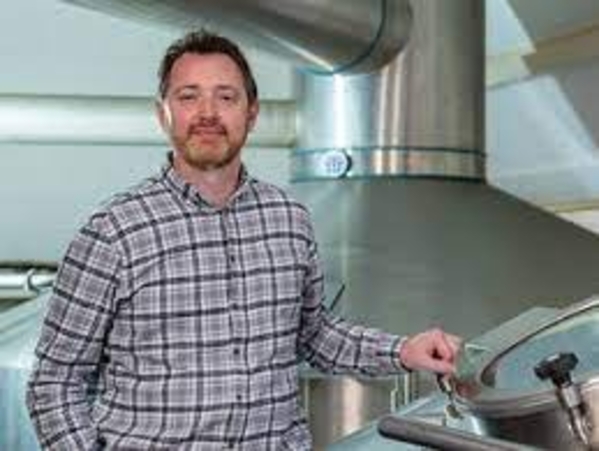Fergus Fitzgerald, the brewer making Adnams fighting fit for the future
Added: Monday, March 28th 2022

Fergus Fitzgerald gestures to the view through a large window on the second floor of Adnams’ brewery: cottages nestling round a green, the Sole Bay Inn next to the red and white striped inshore lighthouse and, a few yards further on, the sea shimmering in the bright sunshine.
“It’s not a bad place to work, is it?” he says. No answer is required. At the age of 46 and recently promoted from head brewer to production director, he has a rewarding job in an idyll where most of us could only dream of living.
Adnams, in Southwold on the Suffolk coast, celebrates its 150th anniversary in 2022 but there will be no resting on laurels. Fergus, with chairman Jonathan Adnams, has been at the heart of fundamental changes they believe will enable the company to flourish in the fiercely competitive world of modern brewing.
Some of the changes have been controversial. Adnams has sold several pubs and now has a small estate of 36 tied outlets. They account for just seven per cent of the brewery’s output and Jonathan and Fergus have used a new brew house to make both cask and craft keg beers for the free trade.
Sales of cask and keg are level pegging and Mosaic, a beer launched in 2013 using a new American hop variety, is sold mainly in keg form. It’s a long way removed from the early days of the real ale revolution in the1970s, when beer lovers would beat a path to Southwold to drink deep of cask Bitter and Broadside and marvel at traditional mash tuns, coppers and high-sided wooden fermenters.
Fergus arrived at Adnams in 2004 and joined head brewer Mike Powell Evans in installing a new German system called Brewstream based on mash mixers, lauter tuns, hop kettles and whirlpools. They enable more brews to be made each day, with wort – the sweet mix of grain and water -- filtered in the lauters, leaving the mash mixers free to start fresh brews.
Mike Powell Evans retired in 2011 and Fergus pays him due tribute: “The new brew house is his legacy.” But modernisation wasn’t complete. Between 2016 and 2017 Fergus oversaw the installation of conical fermenters, conditioning tanks, a filtration plant and an automated kegging line, vessels that allow cask, keg and lager to be brewed.
The new kit followed a distillation plant that produces whisky, gin and vodka, a surprising venture in rural Suffolk but one that has won awards and boosted income.
It’s been a long journey for Fergus. He was born on a farm in Limerick in Ireland and when he grew up beer meant Guinness, Murphy’s and Smithwick’s.
He studied science and biochemistry in Waterford where the college had a relationship with Fuller’s. The west London brewer offered internships to graduates and Fergus went to Chiswick and recalls the shock – a pleasant one – of drinking London Pride for the first time.
Fergus returned to Ireland but when a full-time job was offered at Chiswick he took it with alacrity. He worked in the lab, then quality control and was encouraged by brewer Georgina Young – now head brewer at St Austell – to study for a certificate of brewing with the course run by the Institute of Brewing & Distilling.
He stayed at Fuller’s for seven years and met and married his wife Julie, who also worked there. She’s from Liverpool and she helped cement Fergus’s support for Liverpool football club, first developed when he was a youngster and the club had many Irish players. They have one son, Conor.
Fergus joined Adnams in 2004 as assistant brewer. “The new brew house meant we could do more brews and also use different grains and hops. A beer called Explorer was our first foray into American hops. We played around with different styles and ingredients. We made German Kölsch and Belgian wheat beer, using different yeasts.”
He describes the experiments as “a bit scary. Adnams had never had different yeast strains before but they let us try different things as long as they sold.”
One beer above all has transformed Adnams’ fortunes. While such traditional beers as Southwold Bitter and Broadside use English Fuggles and Goldings hops, Ghost Ship, launched in 2010, was based on the American Citra variety, then scarcely known in Britain.
Garrett Oliver, the renowned brew master at Brooklyn Brewery in New York City, was in Britain and raved about Citra. Fergus decided to use it in a seasonal beer for Halloween and called it Ghost Ship in memory of the many wrecked fighting ships and smugglers’ boats in the seas around Southwold.
“It just flew,” Fergus recalls. “It was the biggest seasonal beer Adnams had ever produced. It sold out a year later and when I managed to get a regular supply of Citra we made it a permanent beer.”
The 4.5 per cent beer is brewed with pale, rye crystal and caramel malts. Citra is the main hop with American Cascade and Chinook and some English Pilgrim for bitterness. Unusually, Fergus then adds more Citra in the fermenting vessel. The beer has 40 units of bitterness and has an aroma and palate of citrus fruits, with grapefruit and lemon to the fore, balanced by rich biscuit malt notes.
It’s now the brewery’s biggest selling beer and is available in cask, keg, bottle and can. It has led to a spin-off, Ghost Ship 0.5 per cent. Unlike many low alcohol beers, this one doesn’t taste like unfermented wort or cold Horlicks but is highly drinkable, with a good flavour of malt and hops.
“We installed a reverse osmosis plant in 2018,” Fergus says, “and within six months we had to double the capacity”. Remarkably, the beer is now Adnams’ third biggest-selling brand. The plant removes the alcohol but doesn’t strip out aroma and flavour. The alcohol isn’t wasted and is pumped to the distillery.
Lack of waste is another Adnams’ theme, one that is highly praised and followed by a number of other breweries. Fergus, Jonathan Adnams and their team are keen to support the environment and “put something back”.
A new warehouse has a living roof of natural vegetation that captures rainwater used to clean the buildings, wash delivery vehicles and flush toilets. In the brew house, steam is captured by a heat recovery system and recycled. Water use has been massively reduced and, along with grain, is exchanged between brewery and distillery.
The gas bill for the complex has been reduced by 30 per cent and refrigeration has been replaced by more eco-friendly plant. Used grain is supplied to local farmers and spent hops go for pig feed. A small tanker that transports the hops carries the slogan “Adnams’ pigs are happy pigs”.
But it’s not been such a happy time for the brewery as a result of the pandemic and lockdowns. The business is split 50:50 between the on and off trades but Fergus says pubs generate the most income.
“We had to build online sales and first we had to get a supply of cans and bottles. We had canning done at West Berkshire Brewery and bottling at Marston’s and Hall & Woodhouse.
“But big volumes of cask beer were thrown away. Cask won’t disappear but it’s been permanently damaged – and that happened before covid. The problem with cask is that it’s a low margin beer for pubs but it needs more effort to look after.
“But we’ll still have it. People will go to pubs that do cask well but it will become more specialised.”
His former colleague at Fuller’s, now retired head brewer John Keeling, has argued that cask ale should have lower duty rates to help it recover. Fergus laughs. “It’s a nice idea but big brewers would find a way round it. Fancy a pint of Carling Cask?”
His new role as production director is the result of Adnams’ head of wine moving on – the brewery is also a major wine merchant and the company wanted somebody who understood flavour to take charge of both beer and wine. The new head brewer is Dan Gooderham, Suffolk born and bred, and he shares an office with Fergus.
They are busily producing new beers. Fergus, in his old role, had made collaborative brews with Cigar City, Harpoon, Firestone Walker and Rogue in the United States and Camden and Magic Rock here. The beers were for festivals in Wetherspoon’s pubs and there may be more “collab” brews in the future.
A popular lager called Dry Hop has been followed by Kobold that takes its name – courtesy of research by Jonathan Adnams – from a German sea spirit that protects ships.
The same spirit is needed to protect cask beer. Fergus, along with everyone at the brewery, was delighted to receive a gold award from CAMRA in the Campaign’s celebratory 50th year for Adnams’ support for real ale.
“Don’t worry – cask beer won’t die,” Fergus says reassuringly as we sample handpumped Ghost Ship and Bitter in the Sole Bay Inn, with the sea lapping on the shore a few yards away. In such a glorious setting you just have to believe him.

Chairman Jonathan Adnams says: “Fergus took over as head brewer from Mike Powell Evans as we had finished installing the Huppmann Brewstream in 2007. It was always my intention that the Brewstream should enable Adnams to push out new styles of beer and allow us to deal with a much wider range of raw materials.
“Fergus proved to be the perfect head brewer to meet both the challenge of optimising the Brewstream for Adnams’ traditional cask beers and develop a stunning array of new styles of beer.”
Jonathan says the proof of Fergus’s success is that Ghost Ship is now the brewery’s leading brand. He adds that Fergus initiated and developed a series of collaboration beers that greatly increased Adnams’ brewing experience with new varieties of hops and exciting brewing ingredients such as tea, herbs and spices.
“And Fergus led the way for Adnams to invest in a reverse osmosis plant that has enabled us to take a leading position in that growing market.
“As a great team player and people manager, Fergus believes strongly in employee workplace development and education, and is able with great skill to pass on his passion and enthusiasm for beer to others.”
•First published in BEER magazine, spring 2022. Photo of Jonathan Adnams courtesy Archant.






